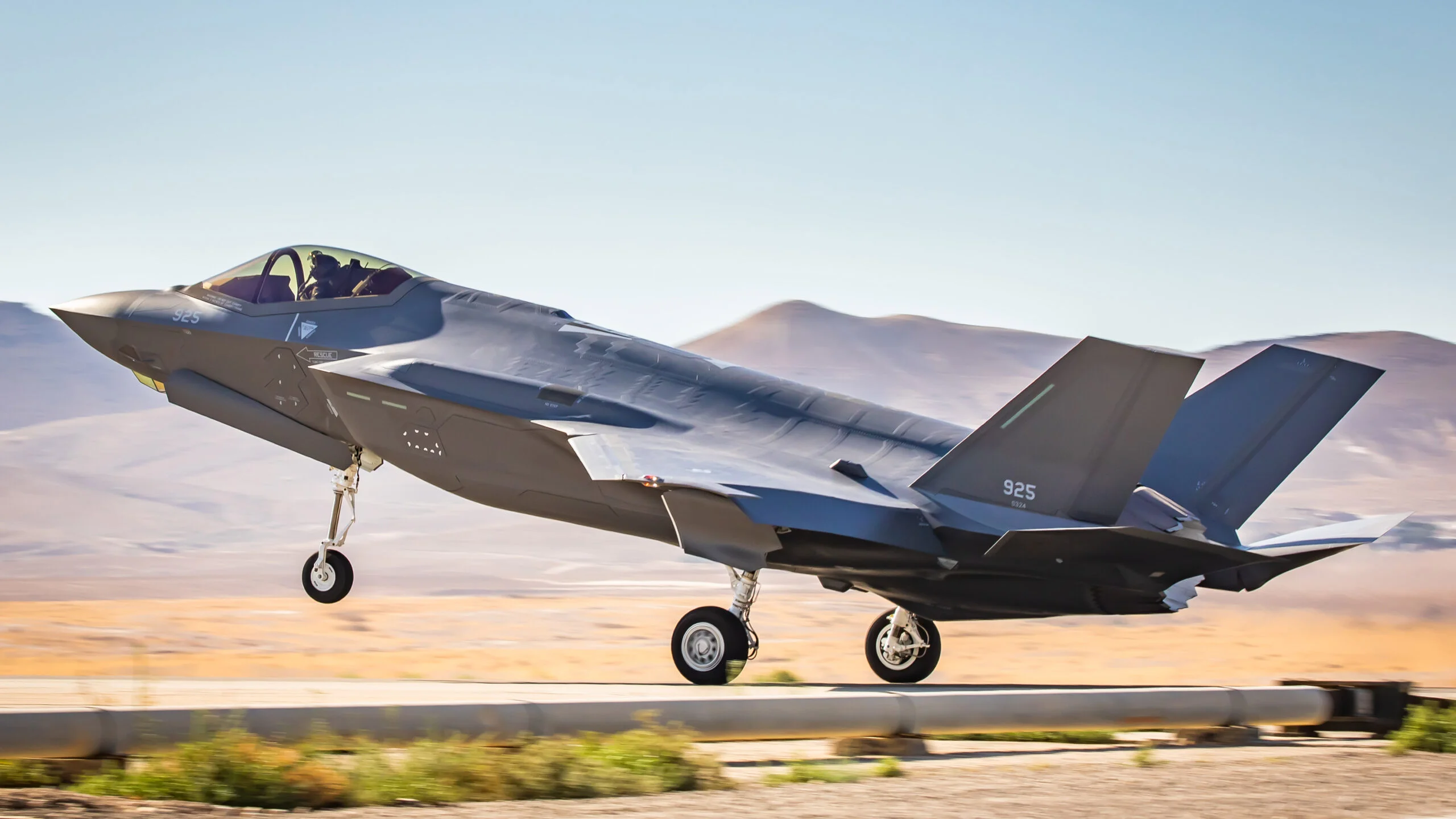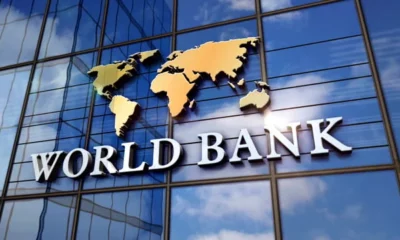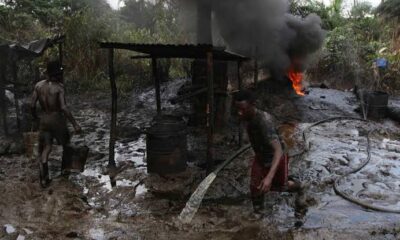Strictly Personal
Morocco should use ever-growing ties with Israel to procure F-35 fighter jets, By Samir Bennis
Published
9 months agoon

As the winds of Western Sahara diplomacy continue to blow in Morocco’s direction, this week has been marked by another crucial development for the seemingly, increasingly irreversible Moroccan momentum on this lingering territorial dispute.
Indeed, whatever one may think of Israel as a country, and regardless of the expected torrent of dismissive statements from Algeria, a dispassionate reading of MENA geopolitics suggests that the Israeli recognition of Morocco’s sovereignty over its Western Sahara adds more strategic depth to Morocco’s ongoing annihilation of Algeria’s unrelenting lobbying for the creation of an independent state in southern Morocco.
Having said that, Morocco’s next strategic move should be to explore the possibility of buying the US-made F-35 fighters. Obtaining these fighters would permanently alter the military balance of power in the Maghreb in Morocco’s favor.
Despite the heavy investments Morocco has made in recent years to upgrade and reinforce its military, it still lags behind Algeria in terms of air power. Algeria’s petrodollars have enabled it to build a military edge over Morocco in this area.
In keeping with its determination to maintain its qualitative air superiority over Morocco, Algeria has engaged in negotiations with Russia with the view to buy the Su-75 Checkmate fighter jet. Manufactured by Russia’s Sukhoi, the Su-57 is equipped with stealth technology and is meant to rival the US-made F-35. Should Russia and Algeria’s negotiations come to fruition, the Algerian regime could obtain the fighter jet by 2029.
But this military edge that Algeria seeks to reinforce, could be shattered permanently in the event that Morocco succeeds in convincing the US to allow it to enter the select club of countries who are permitted to buy this state-of-the-art F-35 fighter jet.
It is an open secret that one of the basic tenets of US foreign policy in the Middle East is to allow Israel to maintain its qualitative military edge and superiority over its neighbors. All US administrations over the past decades have abided by this policy and abstained from striking any military deal that could erode Israel’s military edge over its neighbors.
This explains why, as of today, Israel is the only country in the Middle East to have the sought-after F-35 jets in its arsenal. Sure enough, the US did sign in January 2021 a deal with the UAE that would have made the Gulf nation the first MENA country to obtain this fifth-generation fighter. Yet the deal has been at a standstill because of a number of conditions that the Biden administration imposed on the UAE government.
Washington’s growing concern about Abu Dhabi’s evolving economic ties with China is the primary reason why negotiations between Abu Dhabi and Washington over the finalization of the sale and delivery of the F-35 have stalled. In other words, the US is also unhappy with the UAE’s strengthening of its trade and technology relations with China.
Additionally, the US is displeased with the contracts that some Emirati companies signed with the Chinese company Huawei to provide them with 5G technology. US officials fear that the deployment of the Huawei cell towers close to F-35 bases would enable China to steal information about the F-35 technology.
The diplomatic significance of Israel
Israel’s mediation was instrumental and indispensable for the UAE to engage in negotiations with the Trump administrations in relation to acquiring the F-35. Morocco could take this same approach, and use its ever-growing ties with Israel as a stepping-stone to procure the sought-after F-35.
With Morocco’s growing security and military ties with the US — which reached a new milestone with the signing of a 10-year military agreement in 2020 — and its status as a major non-NATO ally, the course is clear for the North African kingdom to procure the F-35 fighter jets.
Make no mistake, as long as Algeria is governed by a military junta that is bent on destabilizing and destroying Morocco, there can be no normalization of relations between Algiers and Rabat. As long-time, keen observers of North African geopolitics will recall, Morocco has over the past few years made several attempts to extend an olive branch to Algeria, urging its leaders to usher the region in a new era of cooperation and a win-win partnership.
Morocco’s efforts have proved pointless in the face of Algeria’s deep-rooted obsession with undermining Moroccan territorial integrity in order to emerge as the Maghreb’s foremost and undisputed regional hegemon.
And so, given Algeria’s long history of hostility towards Moroccan institutions, history, and cultural heritage, it is ultimately unwise to expect any Algerian-Moroccan reconciliation in the near future. Instead, Morocco’s attempts to find common ground seem to have exacerbated Algeria’s determination to antagonize Morocco. Guided by the same myopic and anachronistic worldview in which it sees itself as the hegemon of the Maghreb, Algeria views Morocco as the only major obstacle that stands in the way to realizing its goal of regional primacy.
Morocco – Algeria’s ‘useful’ scapegoat
With Algeria’s military persistence to use Morocco as a scapegoat and the culprit of setbacks it has suffered in recent years on the diplomatic, political, economic, and sporting fronts, chances of its leaders engaging in a military confrontation with Morocco remain high.
The conventional wisdom remains that despite their decades-long arms race, Algeria and Morocco are unlikely to engage in a direct confrontation given the devastating consequences such a war could have for both countries in particular, and for regional stability and security in general.
Still, it would be foolish to completely rule out the possibility, however remote or tiny, of a full-scale military showdown between Algiers and Rabat.
Indeed, in today’s context an unprecedented torrent of hostility and Morocco-bashing coming from Algeria’s media and politico-military establishment, a hypothetical resumption of the Hirak movement in the country could push the top-brass military to go for a military confrontation as a way of deviating the attention of the Algeria people from their country’s economic and social woes.
Given the volatility and unreliability of Algeria’s military leaders, the only way forward for Morocco to prevail in this decades-long regional rivalry and to avoid this scenario is to have the military might that would deter Algeria from taking any actions that might endanger peace and stability in the Maghreb region.
In this tense and potentially explosive context, Morocco’s securing the F-35 and the subsequent, accompanying military and political backing from both the US and Israel appears to be the surest and best means of deterrence against Algeria.
Even in the event Algeria was to procure a Russian fifth-generation fighter jet, it would fall short of matching the qualitative air superiority that Morocco would be provided thanks to the cutting-edge technology of the F-35, which is far superior to that of the Chinese or the Russians.
The ongoing war in Ukraine has provided ample evidence that Russia’s military technology lags far behind its US counterpart. Experts blame Russia’s failure to achieve air superiority over Ukraine to flaws found in the Su-57, the first version of its stealth technology. And to date, there are no guarantees that the second version of Sukhoi’s stealth technology will not have similar flaws as those found in the first version.
Israel’s recognition of Morocco’s sovereignty over the Sahara has reinforced the ever-growing and irreversible global consensus that a political solution within the framework of Morocco’s sovereignty is the only way of bringing the dispute to a close and preserving regional peace and stability.
If the Moroccan government takes the necessary actions of further upgrading the country’s military’s firepower and operational capability in the coming months and years, not only will Morocco effectively preempt an Algeria-induced military confrontation in the region, but it would also — and perhaps more fundamentally so — be preserving the strategic and diplomatic breakthroughs it has achieved of late on the Western Sahara question.
Samir Bennis is the co-founder of Morocco World News. You can follow him on Twitter @SamirBennis.
You may like
-


Survey ranks Egypt, Ethiopia, Morocco, South Africa among 15 ‘cheap countries’ for family trips
-


Radisson Group targets 25 hotels in Morocco by 2030
-


Moroccans celebrate ‘special towncrier’ who works only during Ramadan
-


Morocco wins gold at COSAFA Beach Soccer Tournament in South Africa
-


CIH Bank partners Google to launch Google Pay in Morocco
-


South African women of Jewish descent stage protest against Hamas
Strictly Personal
Air Peace, capitalism and national interest, By Dakuku Peterside
Published
2 weeks agoon
April 16, 2024
Nigerian corporate influence and that of the West continue to collide. The rationale is straightforward: whereas corporate activity in Europe and America is part of their larger local and foreign policy engagement, privately owned enterprises in Nigeria or commercial interests are not part of Nigeria’s foreign policy ecosystem, neither is there a strong culture of government support for privately owned enterprises’ expansion locally and internationally.
The relationship between Nigerian businesses and foreign policy is important to the national interest. When backing domestic Nigerian companies to compete on a worldwide scale, the government should see it as a lever to drive foreign policy, and national strategic interest, promote trade, enhance national security considerations, and minimize distortion in the domestic market as the foreign airlines were doing, boost GDP, create employment opportunities, and optimize corporate returns for the firms.
Admitted nations do not always interfere directly in their companies’ business and commercial dealings, and there are always exceptions. I can cite two areas of exception: military sales by companies because of their strategic implications and are, therefore, part of foreign and diplomatic policy and processes. The second is where the products or routes of a company have implications for foreign policy. Air Peace falls into the second category in the Lagos – London route.
Two events demonstrate an emerging trend that, if not checked, will disincentivize Nigerian firms from competing in the global marketplace. There are other notable examples, but I am using these two examples because they are very recent and ongoing, and they are typological representations of the need for Nigerian government backing and support for local companies that are playing in a very competitive international market dominated by big foreign companies whose governments are using all forms of foreign policies and diplomacy to support and sustain.
The first is Air Peace. It is the only Nigerian-owned aviation company playing globally and checkmating the dominance of foreign airlines. The most recent advance is the commencement of flights on the Lagos – London route. In Nigeria, foreign airlines are well-established and accustomed to a lack of rivalry, yet a free-market economy depends on the existence of competition. Nigeria has significantly larger airline profits per passenger than other comparable African nations. Insufficient competition has resulted in high ticket costs and poor service quality. It is precisely this jinx that Air Peace is attempting to break.
On March 30, 2024, Air Peace reciprocated the lopsided Bilateral Air Service Agreement, BASA, between Nigeria and the United Kingdom when the local airline began direct flight operations from Lagos to Gatwick Airport in London. This elicited several reactions from foreign airlines backed by their various sovereigns because of their strategic interest. A critical response is the commencement of a price war. Before the Air Peace entry, the price of international flight tickets on the Lagos-London route had soared to as much as N3.5 million for the economy ticket. However, after Air Peace introduced a return economy class ticket priced at N1.2 million, foreign carriers like British Airways, Virgin Atlantic, and Qatar Airways reduced their fares significantly to remain competitive.
In a price war, there is little the government can do. In an open-market competitive situation such as this, our government must not act in a manner that suggests it is antagonistic to foreign players and competitors. There must be an appearance of a level playing field. However, government owes Air Peace protection against foreign competitors backed by their home governments. This is in the overall interest of the Nigerian consumer of goods and services. Competition history in the airspace works where the Consumer Protection Authority in the host country is active. This is almost absent in Nigeria and it is a reason why foreign airlines have been arbitrary in pricing their tickets. Nigerian consumers are often at the mercy of these foreign firms who lack any vista of patriotism and are more inclined to protect the national interest of their governments and countries.
It would not be too much to expect Nigerian companies playing globally to benefit from the protection of the Nigerian government to limit influence peddling by foreign-owned companies. The success of Air Peace should enable a more competitive and sustainable market, allowing domestic players to grow their network and propel Nigeria to the forefront of international aviation.
The second is Proforce, a Nigerian-owned military hardware manufacturing firm active in Rwanda, Chad, Mali, Ghana, Niger, Burkina Faso, and South Sudan. Despite the growing capacity of Proforce in military hardware manufacturing, Nigeria entered two lopsided arrangements with two UAE firms to supply military equipment worth billions of dollars , respectively. Both deals are backed by the UAE government but executed by UAE firms.
These deals on a more extensive web are not unconnected with UAE’s national strategic interest. In pursuit of its strategic national interest, India is pushing Indian firms to supply military equipment to Nigeria. The Nigerian defence equipment market has seen weaker indigenous competitors driven out due to the combination of local manufacturers’ lack of competitive capacity and government patronage of Asian, European, and US firms in the defence equipment manufacturing sector. This is a misnomer and needs to be corrected.
Not only should our government be the primary customer of this firm if its products meet international standards, but it should also support and protect it from the harsh competitive realities of a challenging but strategic market directly linked to our national military procurement ecosystem. The ability to produce military hardware locally is significant to our defence strategy.
This firm and similar companies playing in this strategic defence area must be considered strategic and have a considerable place in Nigeria’s foreign policy calculations. Protecting Nigeria’s interests is the primary reason for our engagement in global diplomacy. The government must deliberately balance national interest with capacity and competence in military hardware purchases. It will not be too much to ask these foreign firms to partner with local companies so we can embed the technology transfer advantages.
Our government must create an environment that enables our local companies to compete globally and ply their trades in various countries. It should be part of the government’s overall economic, strategic growth agenda to identify areas or sectors in which Nigerian companies have a competitive advantage, especially in the sub-region and across Africa and support the companies in these sectors to advance and grow to dominate in the African region with a view to competing globally. Government support in the form of incentives such as competitive grants ,tax credit for consumers ,low-interest capital, patronage, G2G business, operational support, and diplomatic lobbying, amongst others, will alter the competitive landscape. Governments and key government agencies in the west retain the services of lobbying firms in pursuit of its strategic interest.
Nigerian firms’ competitiveness on a global scale can only be enhanced by the support of the Nigerian government. Foreign policy interests should be a key driver of Nigerian trade agreements. How does the Nigerian government support private companies to grow and compete globally? Is it intentionally mapping out growth areas and creating opportunities for Nigerian firms to maximize their potential? Is the government at the domestic level removing bottlenecks and impediments to private company growth, allowing a level playing field for these companies to compete with international companies?
Why is the government patronising foreign firms against local firms if their products are of similar value? Why are Nigerian consumers left to the hands of international companies in some sectors without the government actively supporting the growth of local firms to compete in those sectors? These questions merit honest answers. Nigerian national interest must be the driving factor for our foreign policies, which must cover the private sector, just as is the case with most developed countries. The new global capitalism is not a product of accident or chance; the government has choreographed and shaped it by using foreign policies to support and protect local firms competing globally. Nigeria must learn to do the same to build a strong economy with more jobs.
Strictly Personal
This is chaos, not governance, and we must stop it, By Tee Ngugi
Published
2 weeks agoon
April 10, 2024
The following are stories that have dominated mainstream media in recent times. Fake fertiliser and attempts by powerful politicians to kill the story. A nation of bribes, government ministries and corporations where the vice is so routine that it has the semblance of policy. Irregular spending of billions in Nairobi County.
Billions are spent in all countries on domestic and foreign travel. Grabbing of land belonging to state corporations, was a scam reminiscent of the Kanu era when even public toilets would be grabbed. Crisis in the health and education sectors.
Tribalism in hiring for state jobs. Return of construction in riparian lands and natural waterways. Relocation of major businesses because of high cost of power and heavy taxation. A tax regime that is so punitive, it squeezes life out of small businesses. Etc, ad nauseam.
To be fair, these stories of thievery, mismanagement, negligence, incompetence and greed have been present in all administrations since independence.
However, instead of the cynically-named “mama mboga” government reversing this gradual slide towards state failure, it is fuelling it.
Alternately, it’s campaigning for 2027 or gallivanting all over the world, evoking the legend of Emperor Nero playing the violin as Rome burned.
A government is run based on strict adherence to policies and laws. It appoints the most competent personnel, irrespective of tribe, to run efficient departments which have clear-cut goals.
It aligns education to its national vision. Its strategies to achieve food security should be driven by the best brains and guided by innovative policies. It enacts policies that attract investment and incentivize building of businesses. It treats any kind of thievery or negligence as sabotage.
Government is not a political party. Government officials should have nothing to do with political party matters. They should be so engaged in their government duties that they literally would not have time for party issues. Government jobs should not be used to reward girlfriends and cronies.
Government is exhausting work undertaken because of a passion to transform lives, not for the trappings of power. Government is not endless campaigning to win the next election. To his credit, Mwai Kibaki left party matters alone until he had to run for re-election.
We have corrupted the meaning of government. We have parliamentarians beholden to their tribes, not to ideas.
We have incompetent and corrupt judges. We have a civil service where you bribe to be served. Police take bribes to allow death traps on our roads. We have urban planners who plan nothing except how to line their pockets. We have regulatory agencies that regulate nothing, including the intake of their fat stomachs.
We have advisers who advise on which tenders should go to whom. There is no central organising ethos at the heart of government. There is no sense of national purpose. We have flurries of national activities, policies, legislation, appointments which don’t lead to meaningful growth. We just run on the same spot.
Tee Ngugi is a Nairobi-based political commentator
EDITOR’S PICK


Al Ahly, Esperance to clash in CAF Champions League final
Two of Africa’s club giants, Egypt’s Al Ahly and Esperance of Tunisia, will do battle next month over two legs...


Collabo with Burna Boy enabled me buy house for my mum— Mozambican DJ Tarico
Mozambican disc jockey and sound-producer, DJ Tarico, has credited Nigeria’s Afrobeats sensation, Burna Boy, with his sudden wealth which enabled...


RepAir, Cella partner to launch carbon capture in Kenya
Global Direct Air Capture (DAC) firm, RepAir, has entered into a partnership with carbon storage technology company, Cella, to launch...


Mapanza traditional council shares positive outlook on media rights, freedom of expression
Jonathan Muchindu, a representative of the Traditional Council of Mapanza Chiefdom in Choma District, Southern Province, Zambia, asserts that the...


World Bank grants Malawi $57.6 million for food crisis
As a response to its food crisis, the World Bank said on Friday that it would give Malawi $57.6 million...


Nigeria loses N1.29trn annually to crude oil theft, vandalism— Reps Speaker
Speaker of Nigeria’s House of Representatives, Hon. Abbas Tajudeen, has revealed that the country loses a whopping sum of N1.29...


Intel Liftoff Hackathon 2024 calls for applications from African AI startups
Applications for the 2024 cohort of Intel Liftoff Hackathon has opened for African AI startups designed to bring together aspiring...


African men run away from single mothers— Joselyn Dumas
Veteran Ghanaian actress and media personality, Joselyn Dumas, has lamented the fact that most African men shy away from getting...


Former Zambian captain Rainford Kalaba discharged from hospital after near-fatal accident
Former Zambian national team captain, Rainford Kalaba, has been discharged from hospital weeks after he was involved in a near-fatal...


‘Cyber Act fails to protect the vulnerable,’ Student demands media inclusivity for persons with disabilities
Peter Libila, a student at Icof University’s Chipata campus, highlights the lack of awareness among individuals with disabilities and those...
Trending
-

 Metro1 day ago
Metro1 day ago‘Cyber Act fails to protect the vulnerable,’ Student demands media inclusivity for persons with disabilities
-

 Sports1 day ago
Sports1 day agoFormer Zambian captain Rainford Kalaba discharged from hospital after near-fatal accident
-

 Tech1 day ago
Tech1 day agoIntel Liftoff Hackathon 2024 calls for applications from African AI startups
-

 Metro2 days ago
Metro2 days agoNigeria govt cancels 924 dormant mining licences


